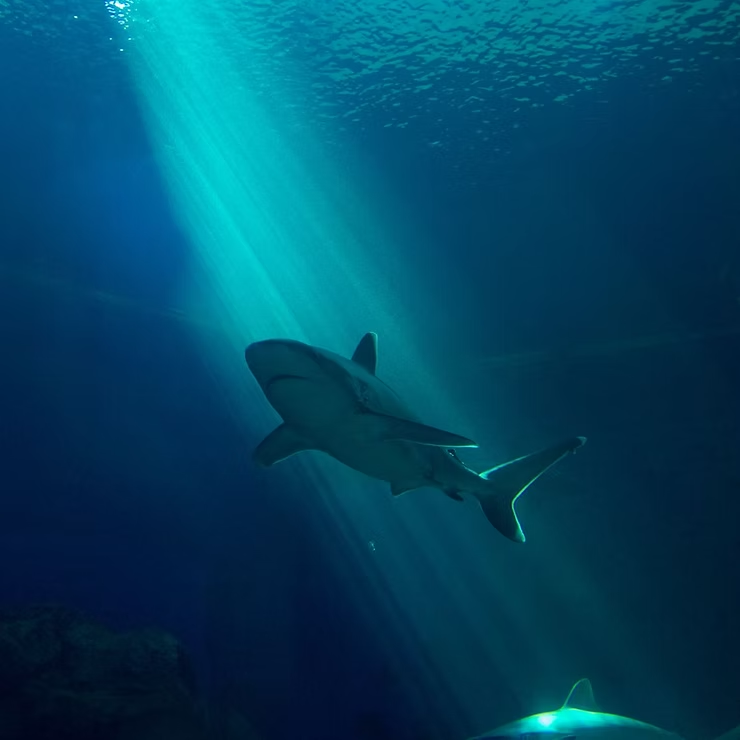Introduction
Sharks have long fascinated humanity, often portrayed as terrifying hunters of the deep. Yet beyond the myths lies a complex predator whose role is critical to the balance of marine ecosystems. This article explores shark behavior, cultural portrayals, conservation efforts, and the wider beauty of ocean life that surrounds them.
Shark Myths and Marine Legends
Separating Fact from Fiction
Sharks are often misunderstood thanks to popular culture. In reality, their behaviors are varied and essential to ocean health. Far from being mindless predators, many species exhibit advanced hunting strategies and even social behaviors.
The Kraken and the Killamari
In games like Palworld, creatures such as Killamari echo myths of legendary krakens. These digital interpretations blend folklore with modern storytelling, showing how ocean legends continue to inspire new generations.
The Immortal Jellyfish
Known scientifically as Turritopsis dohrnii, this tiny jellyfish can revert to its juvenile stage, appearing “immortal.” While not invincible, its regenerative cycle offers scientific insights into aging and cellular repair.
Starfish Versus Sharks
While sharks dominate headlines, sea stars captivate with their vibrant colors and regenerative abilities. With anywhere from five to forty arms, these echinoderms remind us that not all ocean marvels have sharp teeth.
Understanding Shark Behavior
Hunting with Strategy
- Acute senses help sharks locate prey at great distances.
- Stealth and bursts of speed are central to their success.
- Some species coordinate hunts, showcasing cooperation.
Sharks and Social Life
Though many species roam alone, others form groups for migration, mating, or hunting. These temporary gatherings highlight a social side often overlooked.
Underwater Communication
Sharks express themselves through body language. Tail slaps warn rivals, hunched backs signal defense, and rapid swimming can reveal excitement.
Sharks, Whales, and Ocean Giants
Blue Whales: Graceful Titans
Blue whales, the largest animals ever known, grow over 100 feet long and live for decades. Despite their immense size, they survive on tiny krill, reminding us of the ocean’s delicate balance.
Comparing Sharks and Whales
Sharks are apex predators; whales are filter-feeding giants. Both are vital to ecosystems yet symbolize very different aspects of marine life.
Conservation and Challenges
Threats to Sharks
- Overfishing, often driven by the shark fin trade
- Pollution and habitat destruction
- Climate-driven changes in migration and breeding
Protecting sharks helps stabilize food webs and supports healthy coral reef systems.
Media and Awareness
Films, documentaries, and games raise public awareness by showcasing both shark beauty and the fragility of their ecosystems. They connect audiences emotionally to conservation causes.
Encounters and Experiences
Diving with Sharks
Shark dives provide thrilling encounters that often transform fear into respect. Divers witness their grace firsthand and leave with stories that inspire conservation.
Sharks on Camera
Wildlife photography captures the elegance of sharks in motion. These images shift perceptions from fear to appreciation, encouraging protection through beauty.
The Ocean Beyond Sharks
Coral Reefs
Supporting 25% of marine life, coral reefs act as rainforests of the sea, offering biodiversity, protection, and economic value but facing threats from warming waters and pollution.
Bioluminescent Wonders
Microscopic plankton light up the seas, creating glowing waves at night. These displays highlight the mystery and beauty of ocean ecosystems.
Shark Anatomy and Innovation
Biological Engineering
- Teeth: Gripping and tearing prey
- Fins: Steering, balance, and propulsion
- Gills: Extracting oxygen while swimming
Sensory Superpowers
From detecting electrical fields to sensing vibrations, sharks possess heightened senses that make them extraordinary hunters.
Shark-Inspired Technology
Biomimicry has led to shark-skin-inspired swimsuits, antimicrobial medical surfaces, aerodynamic vehicle designs, and even shark-safe gear to reduce conflict with humans.
Conclusion
Sharks are more than symbols of fear; they are guardians of ocean health and sources of human innovation. By protecting them, we safeguard the balance of the seas and preserve the wonder of marine biodiversity for generations to come.

